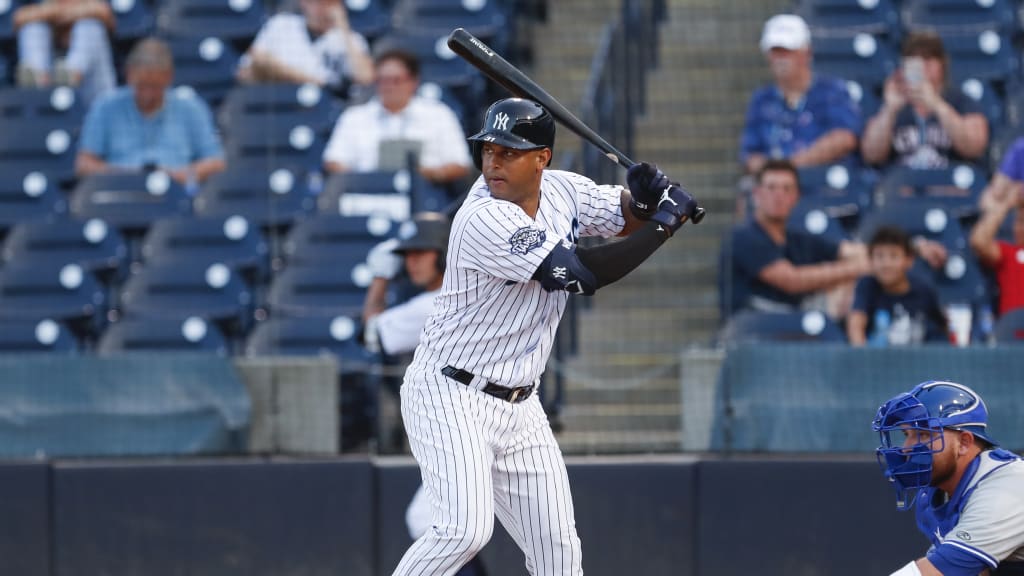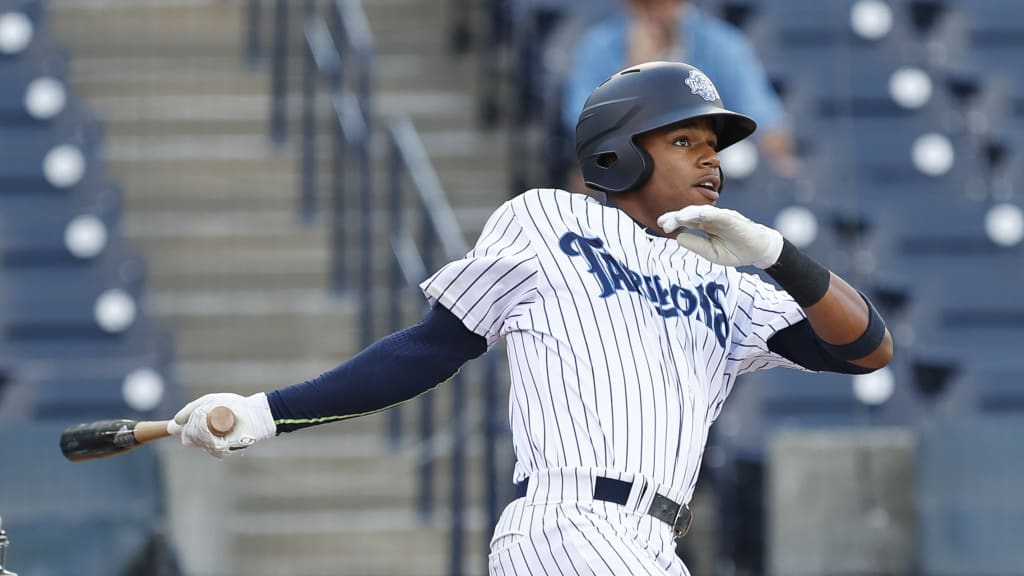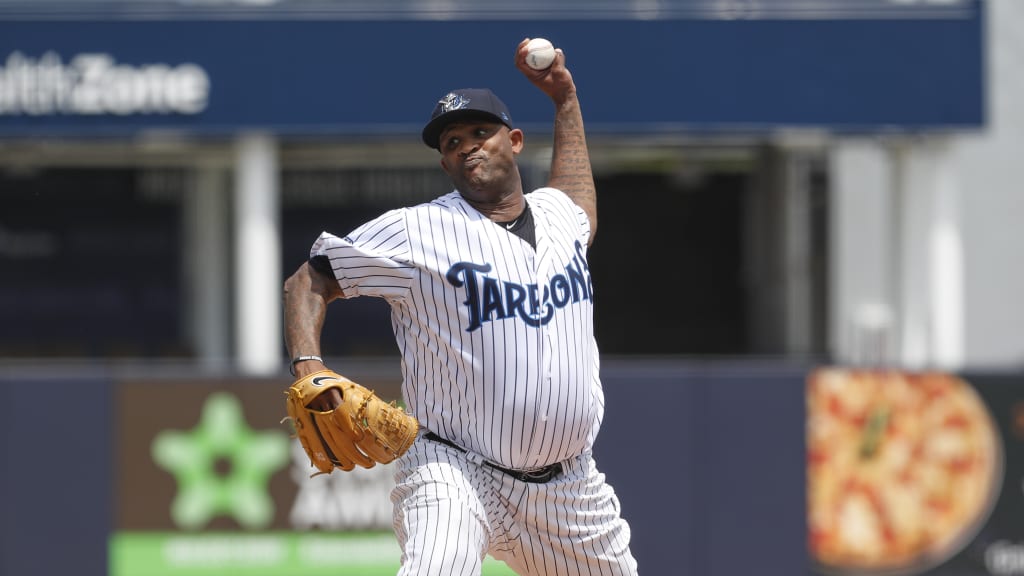
Aaron Hicks was still a teenager when Joe Mauer strolled through the clubhouse. A member of the Twins organization at the time, Hicks was in his first year of pro baseball. Green as the outfield grass that he roamed, he was only beginning to understand his new life. So, who better to speak to than the rehabbing Mauer?
“I couldn’t wait to talk to Joe,” Hicks says, reflecting on his first exchanges with the Twins legend. “I felt like that was the best person to talk to.”
Fast forward to this spring, and Hicks found himself on the opposite end of those encounters. Now the Yankees’ center fielder and an established big leaguer of six years, he was the one dishing advice while recovering from back issues at Single-A Tampa and Triple-A Scranton/Wilkes-Barre. Hicks took a liking to one Minor Leaguer in particular, Tampa Tarpons standout Isiah Gilliam. Both are quick, switch-hitting outfielders with strong arms, so the connection was natural. “I mean, I don’t throw 105,” Gilliam jokes, a nod to Hicks’ cannon of an arm, “but we resemble kind of the same playing style.” And so, Hicks spent a solid portion of his time in Tampa, first at extended Spring Training and then with the Tarpons, chatting up Gilliam, who turns 23 in July. The prospect and the vet would hit in the cages and eat together as Hicks gave Gilliam the lowdown. They talked everything from swing tips to the best Major League cities and have continued to keep in touch now that Hicks is healthy and back in the bigs.
“He’s a guy that wants to get better,” Hicks says from the Yankees’ clubhouse shortly after his return to the Bronx. “He wants to be the best at every level that he’s at, and as long as he stays consistent with his approach, I think he’ll be flying up through the rankings.”
Told of Hicks’ prediction, Gilliam is somewhat taken aback.
“That’s very humbling,” he says. “I hope I don’t let him down.”
***

From the outside looking in, Minor League rehab assignments don’t seem like much. A big leaguer will get hurt, recover, ramp up baseball activities and then play a few Minor League tune-up games before getting back to The Show. When all goes well, it’s just a few days in a small town against lower competition before returning to the game’s highest level.
Behind the scenes, though, rehab assignments are the baseball equivalent of guest lectures for young Minor League farmhands. The presence of an established big leaguer is an opportunity to listen and learn, and with so many Yankees falling victim to the injury bug this season, the organization’s prospects have had a lot of opportunities.
“It’s cool to see legends and big names down there,” says Nestor Cortes, who has bounced between the Majors and Triple-A this season. “It’s fun to have people down there that have experience and have been doing this for a long time.”
“It’s been helpful,” adds pitching prospect Brian Keller, who was doing his own rehabbing at extended spring thanks to a flexor strain. “I can only imagine what it’s like for these new draft guys coming in because right off the bat they’re sharing a locker room with Aaron Judge and Giancarlo Stanton and Dellin Betances and … the list goes on and on. It’s crazy that they’re all around.”
The fact that so many of the Yankees’ biggest names were often not where they’re supposed to be -- the Big Apple -- is not lost on the prospects when they suddenly find themselves sharing a field or facility with household names. As willing as Judge or Stanton or Betances may be to make friends with the Minor Leaguers or play mentor when they’re rehabbing, they’ve got an important goal ahead of them: to get back to the Bronx.
“I guarantee you a lot of them would be totally fine with helping out younger guys, but it’s not what they’re down there to do,” says another extended spring participant, pitcher Michael King. “They’re down there to get their work in and get back to the big league level. I try to leave them alone but squeeze in any little questions I can.”
While it’s not uncommon for Minor Leaguers to be shy about approaching stars on the mend, such concerns are often misplaced. At least, that has been the case with the recovering Yankees. CC Sabathia, who remembers crossing paths with Manny Ramírez and Sandy Alomar Jr. on their rehab assignments while coming up through Cleveland’s ranks, insists that, “If guys want to talk, I’m always open to helping guys out.”
“I feel like I have a ton of time,” Hicks adds. “That’s a time to kind of talk to guys, especially when we’re in the cage. I feel like some guys are kind of standoffish when it comes to guys that are in the cage. They either don’t want to bother them or ask questions, but I make it pretty well known that I’m pretty easy to talk to if you want to talk to me. Whatever questions you have for me, just go ahead and ask me.”
And so, recuperating Yankees become invaluable resources of information for players who dream of reaching the level that they have. Topics of conversation cover everything: What’s your approach against so-and-so’s curveball? What pitch sequence would you use in this situation? How does the Yankee Stadium training room compare to ours? What’s it like to travel first class all the time? How do you handle the pressures of New York City?
Life in the Minors is different from life in the Majors, and prospects want to know all about it before they hopefully get there.
***

There are many aspects of Minor League life that help prepare guys for life in the Majors, but there is one very notable difference down on the farm: the food.
The options inside a Minor League clubhouse pale in comparison to that of a Major League spread, and most Minor Leaguers are restricted financially once they leave those confines. That’s why big leaguers -- who make big league money and are accustomed to eating big league food -- will often take care of the cuisine when on assignment. “You’ve always got to take care of the spread when you’re down there,” Sabathia says. Hicks, who bought two meals at each stop he made, agrees.
“They were nice meals, pretty expensive,” Hicks says, trying not to toot his own horn too much (although Gilliam revealed that the Tarpons were treated to Del Frisco’s on Hicks’ final night in Tampa). “But the whole purpose of that is to kind of show them what big league meals look like on a day-to-day basis. You keep them motivated to get up here.”
There are also more options for entertainment away from the ballpark when activities are being financed by big league salaries. Take the indoor skydiving trip hosted by Didi Gregorius and Jordan Montgomery shortly after the Yankees broke camp, for instance. While recovering from Tommy John surgeries, the pair took a group of Minor Leaguers to an iFLY in Tampa for an atypical bonding experience.
“It’s just getting your mind off of baseball for a little bit and trying to have fun when you’re rehabbing,” Gregorius says. “Your mind needs time to relax.” The shortstop always tries to tell prospects, “You get time to yourself, too. Don’t get stuck on baseball 24/7.”
While food and fun are always appreciated, farmhands can get a lot more out of a Major Leaguer’s Minor League retreat. Gilliam, for example, learned how a big leaguer is supposed to go about his daily business by watching Hicks’ ever-consistent routine. “It kind of defines what a true professional is,” Gilliam says. “He doesn’t really change anything if he had a good game or a bad game.” Then there’s King, who now carries a notebook with him wherever he goes so that he can take meticulous notes on everything he does throughout the day. That’s a concept he adopted from Montgomery. “His attention to detail is something that I’ve never seen,” King marvels.
Whatever a rehabbing big leaguer may offer -- meals, excursions, extra time practicing or working out, advice, lessons, etc. -- the idea is to improve some aspect of Minor League life, to help the next generation of ballplayers climb the ladder. Someone once did that for the Major Leaguers that are doing it now, so the hope is that the cycle of giving back will continue.
That’s not lost on the Minor Leaguers, either.
“We’re always thankful to have people that look out for us,” Cortes Jr. says. “And they do it with the intentions of one day, when we’re [in the Majors], and -- God forbid -- we’re down there rehabbing, we take control of that, too. They’re kind of setting the way.”